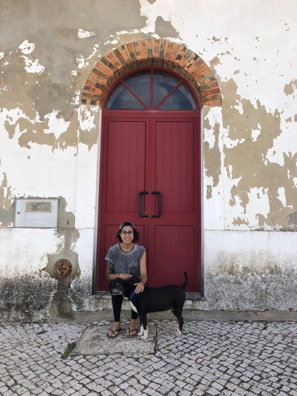Jude Abu Zaineh at Cultivamos Cultura artist residency in Portugal
Author: Jude Abu Zaineh
I spent two weeks of July 2018 at Cultivamos Cultura in São Luis, Portugal. Located on a traditional Portuguese farmhouse in the south of Portugal, the barn that was once used to shelter cattle and make wine in built-in basins and barrels within the architecture, is now transformed into a multidisciplinary art space led by international artist, Marta de Menezes.
From start to finish, a typical day would revolve, around food. We’d begin with an 8am outing to the local market to pick out fresh produce and meat for the day’s meals.

Most fruits and vegetable are picked the night before or that same morning, the meats slaughtered, and the seafood also caught that day before making their way to the market. We’d set the table for breakfast, usually consisting of fresh coffee, tea, and a selection of spreads and cheese to accompany the freshly baked loaf of bread from the local bakery. Once finished, we’d begin a series of workshops or lectures that would feed our creative output. We’d break for a two-hour lunch that also included the meal prep and cooking time, maybe take a stroll to the local cafe for a sip of espresso and Portuguese custard tarts, and continue back to the farm to complete our work.

Dinner Setting
Dinners were usually later in the evening and similarly to lunch, called for a two-hour slot to accommodate meal prep and cooking. Once finished, we’d continue with our series of lectures/workshops/independent work, and head to bed in the wee hours of the night, only to continue with this routine for the next two weeks. Food, cooking and a sense of community around the table were the central components to our time spent living and working together on the historic charming farm in the small town of Sao Luis.
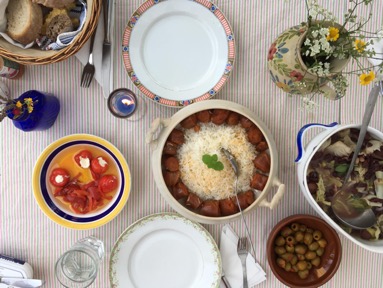
Our activities in between all the food, cooking, and eating varied in discipline and hilarity depending on the visiting artist at the time: we stained fabrics with mold and bacteria that were then stitched by a local costume designer to produce an elaborate sculpture; created a layered collaborative painting of the human nervous system; experimented with different enzyme sources in agar and made our own petri dishes using clay to sculpt and mold parts of our bodies to create new vessels to house our agar; produced an experimental film; fertilized sea urchins which we hunted for in the shorelines of the Atlantic Ocean; and of course, spent much our time working on independent research and experimentation amongst other things.
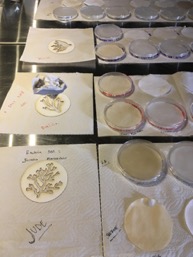
Preparing our fabrics for experimentation with mold and bacteria dyes in the lab
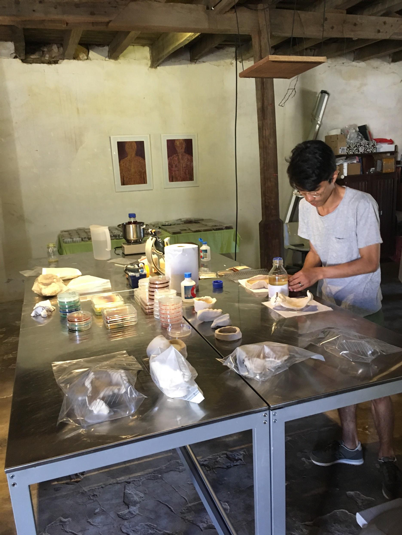
Felipe Shibuya working in the lab
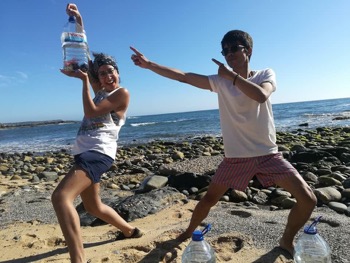
Felipe and I celebrating a successful hunt for sea urchins on the coast of the Atlantic
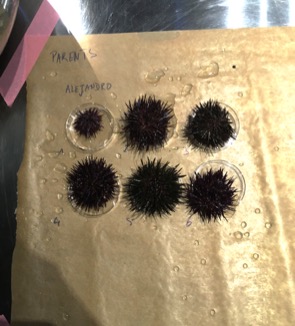
The sea urchins back in the lab ready for fertilization
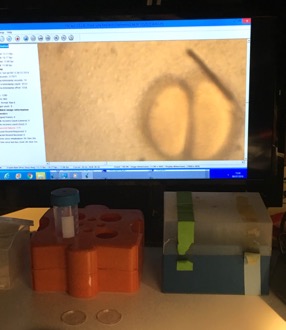
Watching the beginnings of life! The cells of a fertilized sea urchin egg splitting under the microscope
I’ll touch on a couple select projects in a little more detail here:
We experimented with degrading analog film using bacteria, chemicals and other mark-making techniques on film with visiting filmmaker and musician, Antonio Caramelo. We each had our own strip of found footage film (approx. 5 meters in length) that we manipulated either with additive or reductive processes to make marks on the film, stitched all of our strips together and created an experimental film. The final result was digitized and edited further to layer different audio clips recorded from our surroundings in town and on the farm and also included found audio from traditional Portuguese folk singing, ultimately degrading found footage of Norwegian landscapes and introducing São Luís’ local ecology through sound and a sense of embarking on a journey.
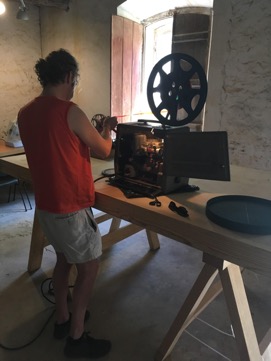
Antonio Caramelo setting up the film projector
Much of my personal practice involves the use of food and technology, the Palestinian immigrant experience, and sense of adaptation and survival in new places. My time at Cultivamos Cultura was poignant to include food as a central part of the experience in learning how culture and histories (both personal and national) continue to strive through the making of a meal and the gathering of people around a table. The idea of food and eating is so simple yet effective in the passing of knowledge beyond the limitations of time and space. I was able to spend my time conducting material research to try and preserve Maqlouba (a traditional Palestinian spiced rice with cauliflower and meat dish) in resin, in an overall attempt to capture this sense of cultural preservation through food. Though my attempts weren’t extremely successful, I also produced some scripture and drawings in petri dishes using the ingredients from the Maqlouba I had prepared, and the results were quite beautiful, especially when documenting the decay and degradation over time and the growth of bacteria. I was able to take this concept and continue building on it once back in Canada.
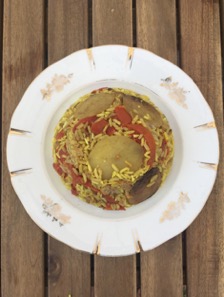
Maqlouba
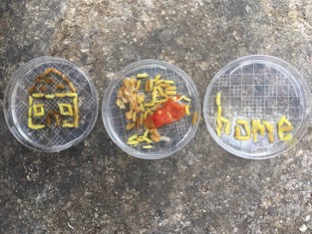
Tests with drawing and text using Maqlouba in petri dishes



The culmination of works produced collectively and individually during the residency at Cultivamos Cultura were then exhibited in Reizes as part of Montras 2018 festival in Portugal.
Thank you to Marta de Menezes & Luis Graça, Dalila Honorato, Andrew & Judy Carnie, Antonio Caramelo, Ana Baleia, Felipe Shibuya, and Claudia Figueiredo, for your wonderful hospitality, company, and adventures.
Last but not least, thank you to my advisor and mentor, Dr. Jennifer Willet for your unwavering support.
This artist residency was funded in-part by INCUBATOR Lab and the School of Creative Arts at the University of Windsor.
Jude Abu Zaineh is an MFA candidate at the University of Windsor (Canada) and works as a research assistant at INCUBATOR Art Lab (Canada). Although trained in more formal elements of art, her current practice explores the use of biotechnology with an interest in dissecting the meanings of culture, displacement, diaspora, and belonging within the Palestinian immigrant experience; particularly in drawing parallels between middle-eastern and western culture using food and the intersection of art and science. Having lost both her parents at an early age, Abu Zaineh’s practice also navigates through topics of loss, memory, and nostalgia to develop aesthetics rooted from her childhood and upbringing as a Palestinian in Kuwait.
https://cultivamoscultura.com/
https://www.judeaz.com/

